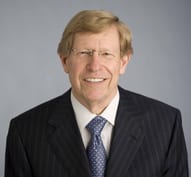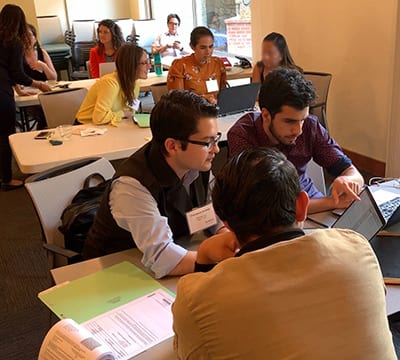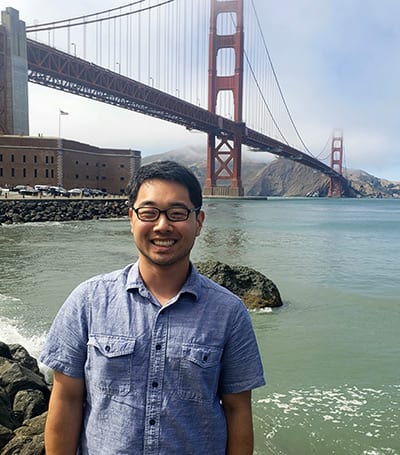By Andrew Cohen

On Nov. 12, the U.S. Supreme Court heard oral arguments in three consolidated cases—including Department of Homeland Security v. Regents of the University of California. At issue: whether courts can review the decision to end the Deferred Action for Childhood Arrivals (DACA) policy and, if so, whether that decision was lawful.
In September 2017, President Trump ordered an end to the then five-year-old policy, which shields young undocumented immigrants from deportation and enables them to work legally. Three nationwide injunctions from U.S. district courts have allowed DACA recipients to submit renewal applications.
From Dean Erwin Chemerinsky and clinic directors to pro bono program leaders and students, the Berkeley Law community has worked in various ways to protect DACA and its recipients. At the Supreme Court oral argument, attorney and alumnus Theodore Olson ’65—a renowned conservative—argued that the decision to rescind DACA was unreasonable and illegal.
“I am proud to have been on the legal team challenging the rescission of DACA from the beginning of the litigation,” Chemerinsky said. “It is simply illegal and inhumane that President Trump has rescinded this program and put 800,000 people at risk of losing their ‘deferred deportation’ status. I am delighted that Ted Olson (decided to argue) this case.”
Berkeley Law Professor Sarah Song, whose book Immigration and Democracy was published last year, discusses DACA’s legal and cultural implications in a Q&A available here.
Olson has argued 63 cases in the Supreme Court, many of them as U.S. Solicitor General under President George W. Bush. While serving in the Justice Department for Republic presidents, he often called for robust executive power.
In a recent New York Times interview, Olson affirmed the importance of such power but said it must be exercised “in an orderly fashion so that citizens can understand what is being done and people whose lives have depended on a governmental policy aren’t swept away arbitrarily and capriciously. And that’s what’s happened here.”
Close to home
California has far more DACA recipients than any other state, over 188,000 according to a recent Center for American Progress report. In recent weeks, Berkeley Law’s Pro Bono Program ramped up its already robust programming for DACA recipients.
On Oct. 25, the program hosted a clinic at the law school with Centro Legal de la Raza and Morrison Foerster. That gathering served 15 DACA clients from the area, and the Berkeley Law Community Service Group raised funds to cover the $495 renewal application fee for each of them.

“DACA recipients are part of our law school community and part of the Bay Area community,” says Pro Bono Program Director Deborah Schlosberg. “Given the Supreme Court case, we thought it was the most timely clinic to do during National Pro Bono Week. We’re thrilled with the collaboration …because it’s emblematic of the power of pro bono work.”
Students at Berkeley Law’s East Bay Dreamers Project have taken part in three DACA clinics in partnership with the East Bay Community Law Center (EBCLC). That effort helped 52 people—about half of them UC Berkeley students—complete and submit DACA renewal applications.
Before assisting with the applications, the law students conduct general intake interviews with clients to assess whether they are eligible for any alternative, more permanent, forms of immigration relief. After the students helped clients complete the renewal forms, EBCLC staff attorneys review all paperwork. Before that round of clinics, Berkeley Law students at EBCLC’s Immigration Program filed more than 20 other DACA applications.
EBCLC has also ramped up its partnership with UC Berkeley’s Undocumented Students Program. This includes offering weekly appointment availability at its office and on campus, and facilitating know-your-rights trainings on changes to DACA and handling encounters with Immigration and Customs Enforcement.
“In addition to DACA renewals, which are crucial, we’re screening undocumented students and community clients and have identified many more remedies to provide more robust protections, including Special Immigrant Juvenile status, asylum, family-based, and U-visa relief,” says EBCLC’s Rosalyn Sternberg. “These are generally more complex legal processes, and our clinical law students gain highly specialized skills through this case work.”
In September, EBCLC launched a partnership with Laney College to bring weekly DACA services to the Oakland campus.
“Berkeley Law students have been absolutely integral to EBCLC’s success in managing the high volume of DACA renewals and general immigration consultations that the Immigration Program has fielded over the course of this semester,” Sternberg says.
A personal pursuit
First-year Berkeley Law student Yongbin Chang brought ample perspective to his role helping DACA clients at the Oct. 25 clinic (see a video about that clinic here). A DACA recipient himself, he came to the U.S. in 1999 at age 3 with his mother and father—who had no other family members in the country—and lived in several Bay Area cities.

When he applied to UC Berkeley, Chang read how the school offered wide-ranging services and support for undocumented students.
“More and more, I realized that it would be harder to hide my own undocumented status if I was to become the type of student leader and person I wanted to be,” Chang says. “People rarely think of Asian people as part of the undocumented community, and I wanted to help show that this is a broad issue that affects people from many backgrounds.”
Soon after he told a few select friends, his “triggering moment” came toward the end of his freshman year as a campus orientation leader. Speaking to about 300 parents of incoming students, Chang revealed that he was undocumented.
“I was shaking and wondered if I could get the words out,” he says. “After, a parent came up and said he’d skipped work for the first time to bring his daughter to college. He told me she was undocumented, and that hearing my story made him feel like she would be okay. He started crying, I started crying … it was a powerful moment to step up and help other people know they’re not alone.”
As an undergrad, Chang worked 30-plus hours a week to finance his education and support his parents. But working with the East Bay Dreamers Project, he says, affirms the hopes he has for his own future and his fellow DACA recipients.
“It’s a great reminder for why I wanted to go to law school,” Chang notes. “Helping people and putting their mind at ease, it’s very rewarding. We don’t know how the Supreme Court will rule on DACA, but in the undocumented community the idea of hope is very powerful. We’re used to going against the odds.”